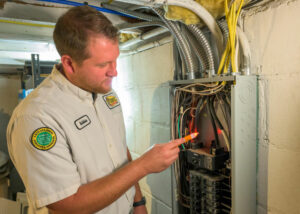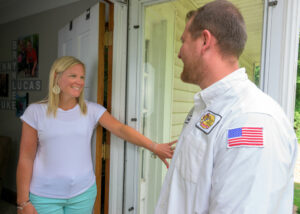What Should You Do in Case of a Power Outage?
Imagine this: you’re in the middle of a great movie or cooking up a storm in the kitchen when—bam! your lights go out, your favorite gadgets power down, and you’re left in the dark.
Power outages and electrical emergencies can be frustrating and, sometimes, a bit scary. But fear not, dear homeowner! This guide is here to help you navigate through those dark times with ease and confidence.
Stay Calm and Assess the Situation
First things first, don’t panic. Power outages can happen for many reasons, from a blown fuse to a city-wide blackout. Take a deep breath and assess the situation.
Is the outage just in your house or is the whole neighborhood affected? Peek outside your window or check with a neighbor to see if they have power. This can give you an idea of whether the issue is local or widespread.
Safety First: Unplug and Protect
Power surges can occur when the electricity comes back on, which can damage your appliances. To protect your electronics, unplug them during the outage. This includes TVs, computers, and other sensitive devices. Leave one light on so you’ll know when the power is back.
Check Your Circuit Breaker
Sometimes, the fix is closer than you think. Head to your circuit breaker panel and see if any switches have tripped. If you find one, flip it back on. If the power still doesn’t return, the problem might be outside your home.
Report the Outage
If the outage appears to be more than just your home, report it to your local utility company. Many companies have hotlines or apps for this purpose. Sharing your address and details of the outage can help them restore power faster.
Light Up the Dark
Gather your flashlights, candles, and lanterns. Having a dedicated drawer or box with these items can save time when the lights go out. Avoid using open flames, if possible, especially with small children or pets around. Flashlights are safer and more reliable.
Keep Warm or Cool
Depending on the season, you may need to take steps to stay comfortable. In winter, layer up with blankets and warm clothing. Close off any rooms that aren’t in use to conserve heat. In summer, stay cool by drinking water, wearing light clothes, and avoiding heavy meals that can make you feel hotter.
Preserve Your Food
Your fridge and freezer can keep food cold for a while, but it’s important to keep the doors closed as much as possible. A full freezer can keep its temperature for about 48 hours (24 hours if it’s half-full). To extend this time, use ice packs or coolers if necessary.
Stay Informed
A battery-powered radio can be your best friend during a power outage. It keeps you updated on the situation and any important announcements from local authorities. Alternatively, use your smartphone sparingly to check news updates, but be mindful of your battery life.
Backup Power Solutions
Consider investing in a generator for longer outages, especially if you live in an area prone to them. Generators can keep essential appliances running until the main power is restored. Make sure you follow the manufacturer’s instructions and never use a generator indoors.
Prepare an Emergency Kit
Having an emergency kit ready can make your life much easier during an outage. Include items like bottled water, non-perishable food, batteries, a first-aid kit, and any necessary medications. Think of it as your go-to stash for unexpected situations.
Stay Connected
Keeping in touch with family and friends is crucial during a power outage. Let them know you’re safe and check on them if you can. Social media can also be a good way to stay updated and reach out for help if needed.
Prepare for Future Outages
While you can never predict when a power outage will occur, there are steps you can take to prepare for future outages. Consider investing in backup power sources, such as solar panels or a home battery system, to help keep your essential appliances running during an outage.
It’s also important to have a designated emergency kit specifically for power outages that includes items like extra batteries, a portable charger for your phone, and non-perishable food.
Additionally, it may be helpful to educate yourself on how to safely operate a generator and have it ready in case of a longer outage. Keep important documents and contact information easily accessible so you can quickly report the outage and stay informed.
By taking these steps proactively, you can minimize the inconvenience and potential dangers of power outages in the future. Remember, preparation is key to staying safe and comfortable during unexpected events. So, take some time now to prepare for a brighter tomorrow! Keep shining, even during power outages.
Wrap-up and Takeaways
While power outages can throw a wrench in your plans, being prepared can make all the difference. Stay calm, stay safe, and use these tips to navigate through the darkness effectively. And remember, power outages don’t last forever. Soon enough, the lights will flicker back on, your devices will beep back to life, and you’ll be back to your routine.
In the meantime, consider these moments as opportunities to unplug and unwind. Play board games with family, read that book you’ve been meaning to get to, or simply enjoy the quiet. Sometimes, a little break from our electric world isn’t the worst thing.
We hope this guide helps you feel more prepared for the next time the power decides to take a vacation. Stay safe and keep shining, even when the lights go out!